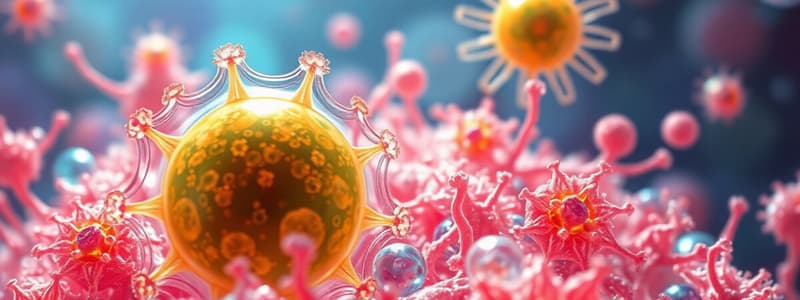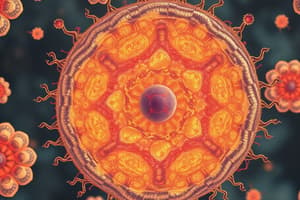Podcast
Questions and Answers
What distinguishes eukaryotic cells from prokaryotic cells?
What distinguishes eukaryotic cells from prokaryotic cells?
- Eukaryotic cells are unicellular organisms.
- Eukaryotic cells contain membrane-bound organelles. (correct)
- Eukaryotic cells are smaller than prokaryotic cells.
- Eukaryotic cells lack a nucleus.
Which of the following is a characteristic unique to prokaryotic cells?
Which of the following is a characteristic unique to prokaryotic cells?
- Absence of a nucleus. (correct)
- Presence of membrane-bound organelles.
- Size larger than eukaryotic cells.
- Examples include plant and animal cells.
Which statement is true regarding the size of eukaryotic and prokaryotic cells?
Which statement is true regarding the size of eukaryotic and prokaryotic cells?
- Prokaryotic cells are generally larger than eukaryotic cells.
- Eukaryotic cells are typically larger than prokaryotic cells. (correct)
- Both types of cells are approximately equal in size.
- Prokaryotic cells vary widely in size compared to eukaryotic cells.
Which of the following cellular structures is found in eukaryotic cells but not in prokaryotic cells?
Which of the following cellular structures is found in eukaryotic cells but not in prokaryotic cells?
Which organisms are primarily composed of prokaryotic cells?
Which organisms are primarily composed of prokaryotic cells?
What is the primary function of the mitochondria in both plant and animal cells?
What is the primary function of the mitochondria in both plant and animal cells?
Which structure in a cell is responsible for controlling the movement of substances in and out of the cell?
Which structure in a cell is responsible for controlling the movement of substances in and out of the cell?
What is the role of ribosomes in both plant and animal cells?
What is the role of ribosomes in both plant and animal cells?
Which of the following best describes the cytoplasm of a cell?
Which of the following best describes the cytoplasm of a cell?
What does the nucleus contain that is crucial for cellular function?
What does the nucleus contain that is crucial for cellular function?
Flashcards
Eukaryotic Cell
Eukaryotic Cell
A cell with a nucleus and membrane-bound organelles.
Prokaryotic Cell
Prokaryotic Cell
A cell without a nucleus or membrane-bound organelles.
Cell
Cell
The smallest unit of life.
Organelles
Organelles
Signup and view all the flashcards
Nucleus in a cell
Nucleus in a cell
Signup and view all the flashcards
Cell Membrane
Cell Membrane
Signup and view all the flashcards
Ribosome
Ribosome
Signup and view all the flashcards
Nucleus
Nucleus
Signup and view all the flashcards
Mitochondria
Mitochondria
Signup and view all the flashcards
Cytoplasm
Cytoplasm
Signup and view all the flashcards
Study Notes
Cell Structure
- A cell is the smallest unit of life that can live independently.
- Cells make up all living organisms and their tissues.
- Eukaryotic cells: Organisms whose cells contain a nucleus.
- Prokaryotic cells: Organisms whose cells lack a nucleus and other organelles.
Eukaryotic Cells
- Larger than prokaryotic cells
- Contain membrane-bound organelles
- Examples include animal and plant cells.
- Contain a nucleus.
Prokaryotic Cells
- Smaller than eukaryotic cells
- Do not contain membrane-bound organelles
- Examples include bacteria cells.
- Do not contain a nucleus.
Studying That Suits You
Use AI to generate personalized quizzes and flashcards to suit your learning preferences.




